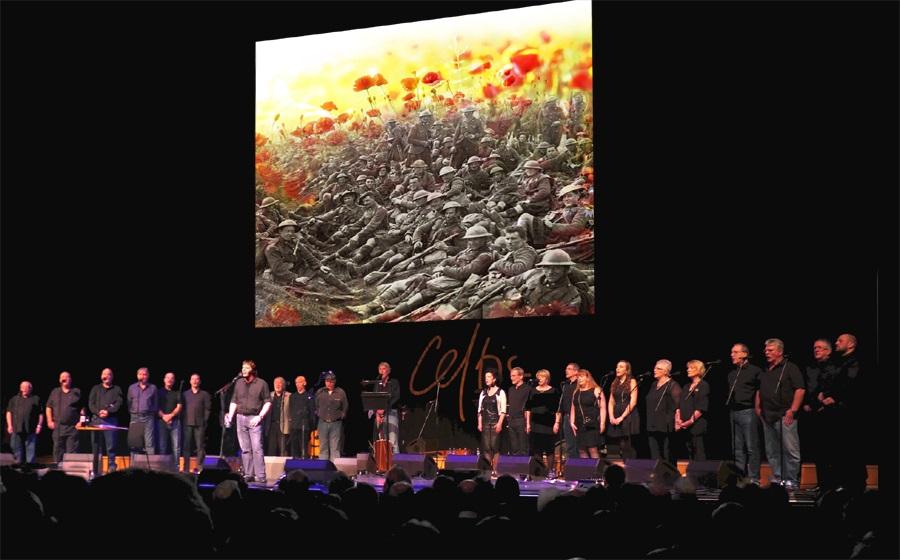It is fitting that this wonderful show, after touring Scotland, should have its final performance on Sunday 11 November, the 100th anniversary of the Armistice that ended the First World War, in a packed Usher Hall.
Far Far From Ypres was devised, written and produced by Ian McCalman of the famous Scottish folk group The McCalmans. It is a two hour multimedia documentary presenting a Scottish view of the war, a war in which Scots died in disproportionate numbers.
It uses many popular songs from the period: recruitment songs to encourage or shame Scots into joining the war effort; music hall songs; marching songs; and also contemporary songs, reflecting back on the futility of war. These are performed by 26 musicians, many of them famous names such as Barbara Dickson and Dick Gaughan; many of them well known to folk song followers such as Carole and Allan Prior, familiar to those on the local folk scene.
The show is narrated by the BBC’s Ian Anderson, who takes us through the evening seamlessly, with applause only at the end of both halves of the concert. The backdrop is a series of still photographs and short movie clips put together by Pete Heywood and these are highly effective in conveying the horror of war.
The songs are very familiar to an audience typically of pensionable age who can regularly join in with some choruses provided in the programme such as Pack Up Your Troubles, Keep the Home Fires Burning, and It’s A Long Way to Tipperary. Everyone joins in the choruses and it is great to see First Minister Nicola Sturgeon among the audience joining in the songs – quite a contrast to Theresa May and Donald Trump in Paris!
There are many fine individual performances during the evening and it is heartwarming to see the great Dick Gaughan back on the stage after his major stroke. The voice isn’t yet back to its best, but there are still elements of that distinctive nasal twang which marked Dick out as one the finest singers of his generation. He sings his own song Childhood’s End which is very poignant.
There are also some other superb contemporary songs such as Eric Bogle’s Waltzing Matilda, beautifully sung by Stephen Quigg. This chronicled the death of 60,000 Australians in the war, many of them at Gallipoli. Also noted is the contribution of many people from all over the Empire, something which was often ignored at the time. The expert narration of Ian Anderson knits together the songs with material from soldiers from all parts of Scotland, poetry and quotations, capturing the differing moods of the periods – from the initial enthusiasm for war and “it will be over by Christmas”, to the horror of the trenches and the revulsion against a war that saw millions die for no great purpose.
A small criticism would be that the anti-war movement, although small, was significant in Scotland – particularly the contribution of the great socialist leader, John McLean – and this could have been explored. But this is a minor point in what is overall a powerful, moving show that ends with the great hymn Only Remembered, arranged by John Tams for the great anti-war show War Horse. At the conclusion, the performers on stage turn to salute the troops on the screen, and we in the audience stand to pay tribute for what has been a deeply moving evening.
